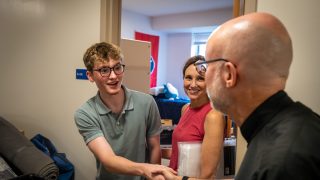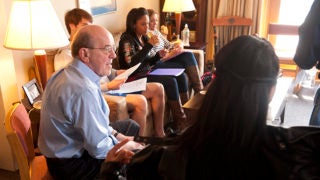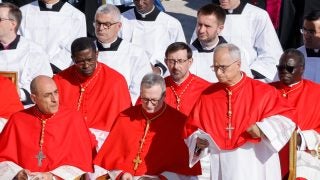Every week, a group of first-year students gathers around a conference table and discusses the future of Catholicism.
The students are part of an Ignatius Seminar, a course designed by a faculty member around something deeply personal to them and grounded in the Jesuit tradition.
For instructor Paul Elie, that something personal was a book, one that held special meaning.

Elie is a regular contributor to The New Yorker and author of The Life You Save May Be Your Own: An American Pilgrimage, a finalist for the National Book Critics Circle Award. He’s devoted his career to writing about religion and the arts.
In June 2024, while writing his next book, Elie began his day with a prayer book given to him by then President John J. DeGioia. As his coffee brewed, he read a collect, or a five-step Christian prayer. His thoughts often turned to DeGioia, who was recovering from a stroke.
The book, sent earlier that year, was filled with collects written by the Northern Irish poet Pádraig Ó Tuama.
“As if President DeGioia didn’t have enough to do, he put this book in my hands; knowing that I’m a religious artist of a kind, he introduced me to another religious artist, one I didn’t know about – a figure in my own field. He speaks often about Georgetown’s convening power, and over the years he has applied his own convening power at a grandmaster level to bring people together. This was a very local instance of that.
“I’m getting a little teary-eyed talking about this,” he said in thinking about DeGioia’s stroke.
As Elie was planning the course, The Future of the Catholic Idea, he wanted to advance DeGioia’s legacy and Georgetown’s Catholic and Jesuit identity. The collect, he thought, offered a vehicle to do just that. This fall, Elie assigned Ó Tuama’s book and asked students to compose five collects of their own, inviting them to reflect on biblical figures, their own needs and desires, and the experience of Catholicism.
“The aim of the course is to initiate Georgetown students into the public conversation about Catholicism from the very beginning of their time on the Hilltop,” said Elie, who’s also a senior fellow in the Berkley Center for Religion, Peace and World Affairs. “For them to actively write collects – that’s a direct initiation. They’re not apprentices; they’re already making liturgical language at age 18.”
















